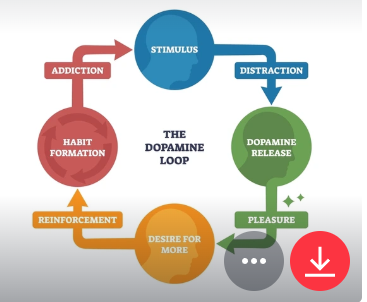What Is Instant Gratification — Why Screens Hook Kids Fast
By Madhurie Singh, July 03, 2025


Namaste dear parents,
Let me begin with a personal moment—during the pandemic, I began casually opening Instagram Reels for quick breaks. But what started as “just five minutes” often turned into 30 or more! Their instant pleasure loop was irresistible. Soon, my sons followed the same pattern, reaching for their phones at the slightest hint of boredom. That’s when I realised: we had all fallen into instant gratification.
If even adults struggle with it, how hard must it be for our children, whose impulse-control centres (prefrontal cortex) are still developing? Understanding what instant gratification is and why screens trap our kids so fast helps us guide them—gently and with compassion.
🌿 What Is Instant Gratification?
Audio of Instant Gratification
Instant gratification means getting what you want—right now, with no waiting involved. In this digital age, screens make this easier than ever:
- A child wins a game level, gets a quick “ding”, and a reward
- They swipe to a new video—an instant surprise
- They post something online and get likes immediately
Each of these triggers a rush of dopamine, the brain’s “feel-good” neurotransmitter. The brain begins to expect this instant pleasure. Over time, children’s brains grow accustomed to fast rewards, making patient, slower life activities feel dull by comparison.
🎯 The Neuroscience Behind It

Dopamine and Reward Circuits
Every habit loop—screen action → dopamine reward → repetition—reinforces itself in the brain’s reward pathways (especially the nucleus accumbens and mesolimbic system) .
Weak Prefrontal Cortex
The prefrontal cortex—responsible for impulse control and delayed gratification—matures late (well into the teens). So, kids respond more to immediate rewards than long-term gains.
Variable Rewards
Screens use variable rewards— especially loves to be surprised which later turns into shocks. For example the unpredictable likes on the social media posts, autoplayed videos that show random topics, and new content that algorithms are popping up on screens —to keep the dopamine flowing, much like slot machines. Gambling games where the brain always imagines that next round it will Win.
📜 Ancient Wisdom — The Rice Bowl Story
In the Mahabharata, sage Vyasa tested the princes: one bowl of ready-to-eat rice and another of uncooked rice. The impatient prince chose the ready bowl, losing his chance. Yudhishthira, who waited and cooked his rice, gained wisdom and blessings. This tale reminds us: true growth lies in patience and effort. (Do you think that the Marshmallow experiment mentioned below was copied from this story from the Mahabharata?)
🎓 Modern Research: The Marshmallow Experiment & Beyond
In the famous Marshmallow Test (Stanford, 1972), children were offered one marshmallow now or two after waiting. Those who waited longer tended to perform better in academics, relationships, and health later on.
Screen research aligns: high screen use correlates with lower delayed gratification in children. Yet, a 2018 University of Minnesota study found today’s kids show more delayed gratification than those in the 1960s—thanks to better parenting and education.
💔 How and Why Screens Hook Kids Fast
- Quick dopamine hits—every click makes the brain feel rewarded, loved, acknowledged
- Constant engagement—autoplay and endless scroll keep the action flowing, boredom is never felt by the brain
- No skill or effort required—unlike homework, games need low investment, no need to learn, mug up, practice
- Emotional comfort—screens soothe boredom, loneliness, and stress
This combination creates a powerful loop that can dominate a child’s routine. That is why kids are the easiest victims of screens and the content creators.
The Content Creators Know Your Child’s Psychology Too Well
Ever wondered why your child is more glued to the screen than you are? It’s not just the screen—it’s who is behind the screen.
Big tech platforms, YouTube channels, Instagram Reels, gaming apps—almost all of them hire top psychologists, behavioural scientists, and MBAs to create content that hooks the human brain. And children, with their still-developing emotional and reasoning systems, are the easiest targets. They believe what they see. Reasoning power is low.
🧠 Colour, Music, and Fonts — Every Detail Is Designed to Hook
Children’s content is no longer created casually. Experts research:
- What color makes a child pause longer? (Hint: bright red and yellow hold attention)
- What voice tone and pitch triggers trust or excitement?
- What music beat matches their heart rate when excited or calm?
Even the fonts and transitions are A/B tested to make the screen feel warm, fun, and familiar. They want your child to not just watch, but to want more.
🤖 The Algorithm Studies Your Child Like a Lab Experiment
Most apps use AI-powered algorithms to monitor your child’s every scroll, pause, like, and rewatch. If your child laughs at one cartoon, they’re shown ten similar ones. If they rewatch one dance, they’ll get 20 more with the same music.
Over time, the algorithm builds a digital fingerprint of your child’s likes, fears, moods, and screen habits—and feeds it back through a perfectly designed stream of dopamine hits.
So yes, your child is not weak. They are outmatched by a trillion-dollar industry engineered to exploit their brain.
That’s why you, the parent, must become smarter, not stricter.
🚫 Why Screens Can Make Real Life Seem Boring
Once hooked on fast media with such colorful fonts, images, music and algorithm:
- Homework seems dull in comparison
- Outdoor play feels too slow
- Friendship takes energy, effort, and patience
- Attention to long tasks collapses, leading to academic and emotional challenges
Screen habits don’t just entertain—they reshape priorities and preferences.
🧸 How Modern Parents Accidentally Fuel Instant Gratification
Let’s be honest. Many of us parents today grew up in very different times. We were told NO often—because there wasn’t enough money, or because things weren’t available, or because our parents were strict and feared spoiling us. Whether it was buying a toy, eating out, or even watching TV, everything came with limits.
Now, as parents ourselves, especially many fathers, we don’t want to say no to our children. We don’t want them to feel deprived the way we sometimes did. This well-meaning love has, unknowingly, created a culture of overindulgence.
- We buy toys in malls and online—even when the budget says wait
- We order food in 10 minutes, even when home-cooked meals were planned
- We swipe for instant delivery from Amazon, even when the child could wait
- We avoid tears or tantrums by giving in quickly, even when it isn’t needed
This kind of parent-led instant gratification becomes the first model children see. And soon, they learn to expect—and demand—everything now. So it’s not just screens that are fast… even parenting has become speed-based. Recognising this pattern is the first step toward restoring balance.
🌟 Scary Stories from My Parent Group And Other Places
A parent shared: her 2-year-old son grabbed her mobile phone the moment she walked in the home after work.
🧒 Toddler Age: Using Screens for Peace
A striking case from Lucknow involved an 18-month-old who would only eat with cartoons playing on a phone. Nutritionists say this is common—the child learns that crying leads to screen time, and then cries at even the thought of no screen. Parents Push Children Towards Screen Addiction. Parents admit, “The phone calms them—but it also wires the brain to expect sugary snacks … or screen time whenever upset.” Turn off the screen, and the toddler throws a real tantrum.
👧 Pre-Teens: The Rebellion Over Smartphones
Australian mother Jade (mum of four) faced daily arguments with her 12-year-old daughter over having a smartphone. After witnessing her eldest struggle with depression and social media bullying, she took a firm stand: No phone right now, dailytelegraph.com.au. Although her daughter was initially angry, she eventually admitted that it improved her mental health. Jade earned recognition for treating the phone as a “privilege, not a right”—a vital lesson for children tempted by instant connection.
👨👩👦 Middle Childhood: The Creativity Breakthrough
Writer Amy Dunn removed screens from her household on weekends and saw positive changes quickly. Her children immediately turned to imagination: building forts, drafting menus, and hosting home “restaurants” complete with menus and roles dailytelegraph.com.au+3dailytelegraph.com.au+3dailytelegraph.com.au+3thethrivecenter.org. Even parents, freed from constant notifications, started enjoying the peace. It became clear: kids—when unplugged—seem to naturally redirect their need for enjoyment into creative play, not passive screen consumption.
👦 Teens: When Games Become Dangerous
In Visakhapatnam and Haryana, a disturbing trend appeared: in one case, a teenager killed his mother after she restricted his phone gaming. Another teen tragically took his own life over gaming addiction when this mom took phone from her teenagers. Experts confirm: over 50% of Indian parents report their children becoming aggressive or impatient because of gaming—another sign that instant gratification via screens can escalate dangerously.
🔍 What These Stories Teach Us
- Toddlers learn powerful associations: small screen rewards yield big calm.
- Pre-teens crave independence, but emotional safety is more important than convenience.
- Middle childhood can blossom with creativity—if we give screens a break.
- Teens may face addictive threats that need proactive, empathetic boundaries.
These real stories from different age stages show screen-related issues aren’t one-size-fits-all. Our solutions shouldn’t be either. Compassionate parenting—understanding each child’s emotional needs and natural development—helps create tailored, effective guidance for saved attention spans, healthier habits, and happier childhoods.
📜 Sanskrit Shloka — Finding Balance
Bhagavad Gita 6.16:
“नात्यश्नतस्तु योगोऽस्ति न चैकान्तमनश्नतः…”
Meaning: Balance is essential—both excess and deprivation disturb peace. This applies to screen time too.
🧩 Bonus Parent Perspective — When Learning Feels Like a Trap
Instant gratification sometimes disguises itself as productive learning:
During the pandemic, I became an avid online learner—buying courses, binge-watching hour-long podcasts, and grabbing knowledge on every topic. Each new concept felt rewarding, like a quick dopamine hit.
But then I realised I wasn’t applying that knowledge. I had left action behind and was stuck in a loop:
Learn → Feel good → Relax → Learn more
It was a smarter version of instant gratification, disguised as self-growth. Realising this taught me to pause and ask: “What am I doing with this knowledge?” It also made me more understanding of my own screen triggers. I took control of my habit, made a plan to break from the addiction. Do you want to know how I did it? Join me here.
💖 My Views — Uniting Ancient Wisdom and Modern Science
Screens aren’t wrong—they are modern tools. But when used constantly for instant joy, they can chip away at resilience, focus, and patience. As a mother, engineer, AI enthusiast, and Sanskrit scholar, I blend digital awareness with ancient insight in my Screen De-Addiction Course for all age groups.
My mission: teach children the strength in waiting, the richness in effort, and the peace in balance. This is my way of preparing them for a future that values deep thinking, real-world connection, and inner calm. Can it be done in one day? No. Can it be done in one week. No. It’s a time taking process which built the habit, so some time has to be given to come out of that habit. Remember, brain loves to be left in doing the least difficult and most comfortable tasks. So changing it’s neuro logical paths is time taking effort.
🛠️ Want To Learn How Parents Can Guide with Compassion?
Join The Trusted Parents Whatsapp Group Here
Fill The Google Form To Connect With Madhurie Singh or Join the Trusted Parents Circle
Join The Screen De-Addiction Course Here
✍️ About the Author
Madhurie Singh is India’s leading education and parenting expert, a school reviewer, computer engineer, Sanskrit scholar, and founder of Trusted Parents. Through ancient wisdom and modern science, she helps parents raise mindful, values-driven children in a digital-first world.
Join The Screen De-Addiction Course Here
Fill The Google Form To Connect With Madhurie Singh or Join the Trusted Parents Circle
Join The Trusted Parents Whatsapp Group Here
Refrences nature.com. Research Paper on Instant






Login is required
Don't have an account? Sign Up